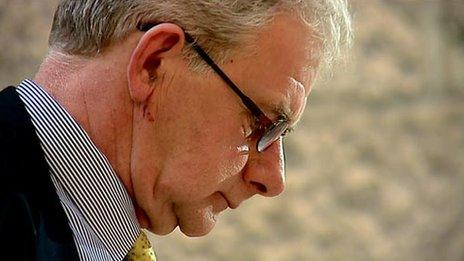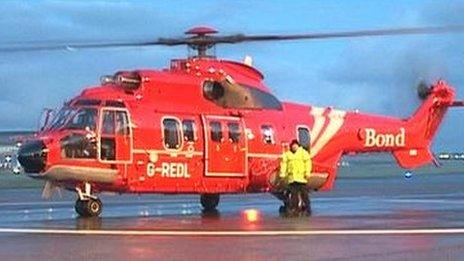Super Puma crash: Five-year wait 'intolerable' for relatives
- Published

Sheriff Principal Derek Pyle said the accident could have been prevented
Sheriff Principal Derek Pyle's findings, external into the Super Puma crash which killed 16 men come almost five years after the North Sea tragedy.
Relatives say that wait has been "intolerable" - and they still want answers.
The Bond Super Puma crashed north east of Peterhead on 1 April 2009.
It suffered a "catastrophic" failure of the main gearbox during a flight from the Miller oil field to Aberdeen, and the crash left no survivors.
The rotor blades separated from the fuselage before the aircraft hit the water.
Audrey Wood, whose son was among 16 people killed in a Super Puma crash in the North Sea, says evidence heard at an FAI will haunt the relatives
An eyewitness on board a nearby ship said he saw the helicopter falling "like a torpedo".
Sheriff Principal Pyle has now said precautions which might have avoided the deaths included following agreed procedures and communications.
He said the operators had considered replacing part of the gearbox after a fault was discovered just a week before the crash - but did not do so because of a failure of communication with the manufacturer.
He said: "The crash was a tragedy.
"Coupled with the other helicopter accidents in Scotland over the recent past, it has raised fundamental questions about the safety of helicopters, not least in the oil and gas industry of the North Sea.
"It cost the lives of 16 men. It has caused considerable public interest. It is therefore particularly important that whatever lessons can be learned from it are properly identified and acted upon."
Sheriff Pyle said: "During the course of the inquiry there was much discussion about the circumstances which led Bond not to follow the clear terms of the maintenance.
"Bond readily acknowledged that they ought to have done so.
"The essential fact is that everyone in the company well knew that maintenance must be done by the book.
"On one occasion, that fundamental rule was broken.

Sixteen men died when the Super Puma crashed
"It resulted in the failure to detect a significant fault in the helicopter's gearbox, which possibly - but only possibly - resulted in the crash."
He explained: "The whole object of impartial public inquiry is to get at the truth, to expose fault where fault is proven to exist, and in all cases to see to it so far as humanly possible that the same mistake, whether it arise through fault or any other reason, is not made in the future.
"The public interest, in whose names inquiries are held, requires and deserves no less."
'Too long'
He noted: "It is instructive to note that the Lockerbie fatal accident inquiry occurred in less than three years from the date of the crash - in contrast to this inquiry which was nearly five years.
"What can, I think, very properly be said is that nearly five years is on any view far too long and that we all have a responsibility for that.
"And that everyone concerned in future fatal accidents involving aircraft of whatever kind should do much better."
Sheriff Principal Pyle added: "No-one could not be moved by the courage of many members of the victims' families who sat through every day of the inquiry."
Audrey Wood, whose son Stuart died in the crash, said the five-year wait had been "intolerable".
"We the families feel let down by the system," she said.
Jim McAuslan, general secretary of the British Airline Pilots' Association (Balpa), said lessons had to be learned in an effort to prevent such tragedies in future.
Mechanical failures
He said: "The operator's maintenance failures which have been drawn out in both the AAIB report and today's FAI report are the main lesson for the industry - maintenance must never be treated lightly.
"Sadly, this accident was preventable, but not survivable, and the pilots had no chance to save the lives of the passengers due to the mechanical failures.
"Pilots are working with the CAA and operators to improve helicopter safety in the North Sea to ensure recommendations to raise and enforce standards are delivered, particularly as memories of recent accidents fade.
"We will be pushing the regulator and operators through our membership of the CAA's Helicopter Safety Review Group to ensure the lessons are learned."
- Published13 March 2014